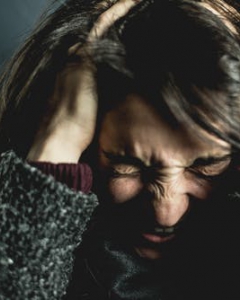Symptoms and treatment of Anxiety neurosis in kids
Anxiety neurosis is an excessive fear of a situation occurring of an ambiguous, repetitive, and prolonged nature that affects life adaptation.
An anxiety neurosis can prevent your kids from making friends, speaking in class, participating in social activities and at school. Children often have feelings of shame, fear, and loneliness.
1. What are symptoms of anxiety neurosis in kids?
2. How to treat anxiety neurosis in kids?
An anxiety neurosis can prevent your kids from making friends, speaking in class, participating in social activities and at school. Children often have feelings of shame, fear, and loneliness. Without treatment, an anxiety neurosis kid is at high risk of having difficulty in school, missing out on important social experiences, and being addicted to addiction.
1. What are symptoms of anxiety neurosis in kids?

Common anxiety neurosis in kids such as generalized anxiety neurosis, obsessive-compulsive disorder, panic disorder, post-traumatic stress disorder, separation anxiety neurosis, social anxiety neurosis, selective mute, specific phobia / ph: pexels
Common symptoms include irritability, insomnia, restlessness, headache, stomach pain. Anxiety neurosis often occurs alongside other disorders such as depression, eating disorders, and attention deficit hyperactivity.
Anxiety neurosis has many levels, in which fear is a common human emotion, the alarm signal of the body's defense mechanism in response to a marked external danger or danger unknown by imagination and often goes away when the danger is over. Normal anxiety is a response to anxiety, fear before a situation, things threatening safety, which are temporary in nature and do not leave consequences affecting study or work. Pathological anxiety is situations that cause anxiety, prolonged fear, repeated many times, if unable to cope, it will trigger the nervous system of plants to act vigorously such as shortness of breath, anxiety, rapid pulse, dizziness, dry mouth, sweating, tremor, restlessness.
Although the situations are no longer threatening, anxiety is still severe and prolonged and disturbs the cognitive and behavioral functions. Anxiety becomes very vague, with unknown subject.
In terms of perception, the subject's senses will have unreal feelings, false perception of reality, or have a vague, unfounded feeling, always worrying, fearing something unfavorable such as fear of death, accident, illness, loved one died ...
Psychologically, the subject will feel tense, restless, persistent discomfort, poor concentration, and an empty mind.
Physically, subject is irritable, impatient, restless, shaking hands and feet, sleep disturbance, sweating even in cold weather, anxiety, palpitations, frequent urination, muscle tension corn, very easily tired, irritable, dizziness, blurred vision or feeling unreal, short of breath when breathing.
Normal feelings of fear in kids appear very early in a child's development. To a certain extent, this emotional state is beneficial, helping children experience and adapt in life. Children have different fears at different ages, but it is important that they overcome and adapt. From 8 months old, the child has known strange and familiar, fear of strangers or when leaving parents. In the early years, children are often afraid of situations such as strange objects, sounds, strangers, strange places ... Becoming older, children are afraid of situations of more abstract nature such as fear of ghosts, fear of dark, fear of being alone ... Teenagers, children fear safety-related situations such as illness, or problems at school such as schoolwork, exams ... Late adolescence young fear of social relationships, body changes, future ...
The causes of these anxiety neurosis are often biological factors combined with environmental factors, stressful events such as starting school, moving house, losing parents or grandparents can trigger the onset of the anxiety neurosis. Stress itself is not the cause of an anxiety neurosis. Anxiety neurosis tends to spread to families but no one blames it on their children. It's not your fault or your child's fault, and a diagnosis of an anxiety neurosis is not a sign of weakness.
Common anxiety neurosis in kids such as generalized anxiety neurosis, obsessive-compulsive disorder, panic disorder, post-traumatic stress disorder, separation anxiety neurosis, social anxiety neurosis, selective mute, specific phobia.
2. How to treat anxiety neurosis in kids?

Anxiety neurosis in kids is a fairly common disease today / ph: pexels
Anxiety neurosis in kids is a fairly common disease today A large study concluded that a combination of Cognitive Behavioral Therapy (CBT) and antidepressant for 7-17 year old children is more effective than treatment alone. CBT teaches skills and techniques to your child that they can use to reduce anxiety.
Your kids will learn to recognize and replace negative thoughts and behaviors with positive ones. Children will also learn to distinguish reality from unrealistic thoughts and receive homework to practice what they learned during therapy. Your kids can use these techniques right away and for many years to come. Your support is important to the success of your child's treatment. The therapist can work with you to make sure the process is done at home and at school, and the therapist can advise on how the whole family can best manage symptoms of your kids. CBTs are generally short-term sessions lasting about 12 weeks but the benefits are long term.
The question is, what can parents do for their anxiety neurosis kids at home?
Recovery can be stressful for everyone, and building a support network from friends and family can be very helpful. Remember the following: listen to your kid's feelings, stay calm when they're worried about a situation or event, recognize and praise their kid's small accomplishments, don't punish minor mistakes or lack of progress in the kid, being soft and trying to maintain normal activities, reducing expectations during times of stress, planning for change (Example: giving more time in the morning if it is difficult for the kid to go to school).
Anxiety neurosis in kids is a fairly common disease today that can be treated by psychiatrists and psychologists. Therefore, parents should bring their children to specialized facilities if the kid has symptoms of an anxiety neurosis. In addition, anxiety neurosis treatment for kids requires the support of the family, the school and the kids’ own efforts.
Symptoms and treatment of Anxiety neurosis in kids
A Quality Daily Anxiety Eating Diet Helps To Reduce Anxiety Neurosis
..for people with Anxiety Neurosis, anxiety does not go away and can get worse over time. However, there are several foods for anxiety eating diet that can help reduce Anxiety Neurosis.
..for people with Anxiety Neurosis, anxiety does not go away and can get worse over time. However, there are several foods for anxiety eating diet that can help reduce Anxiety Neurosis.
Read moreDo You Know that Wandering Thinking can be a Form of Anxiety Neurosis?
Wandering thinking too much can be a form of Anxiety Neurosis. Stop right there before it's too late!
Wandering thinking too much can be a form of Anxiety Neurosis. Stop right there before it\'s too late!
Read moreA Right Diet (Anxiety Eating) helps to Reduce Anxiety Neurosis
Anxiety is a normal part of life. You may feel anxious facing a problem at work, before taking a test, or making an important decision. After those jobs are over, the worry will be over. But for people with Anxiety Neurosis, anxiety does not go away and can get worse over time. However, a right diet (anxiety eating) that can help reduce Anxiety Neurosis.
Anxiety is a normal part of life. You may feel anxious facing a problem at work, before taking a test, or making an important decision. After those jobs are over, the worry will be over. But for people with Anxiety Neurosis, anxiety does not go away and can get worse over time. However, a right diet (anxiety eating) that can help reduce Anxiety Neurosis.
Read moreSymptoms Are Caused By An Anxiety Neurosis
Anxiety Neurosis is now common among young people. The cause of this phenomenon is mainly due to stress, pressure in work and life. Recognizing the symptoms of an Anxiety Neurosis will help patients examine and treat promptly.
Anxiety Neurosis is now common among young people. The cause of this phenomenon is mainly due to stress, pressure in work and life. Recognizing the symptoms of an Anxiety Neurosis will help patients examine and treat promptly.
Read more






